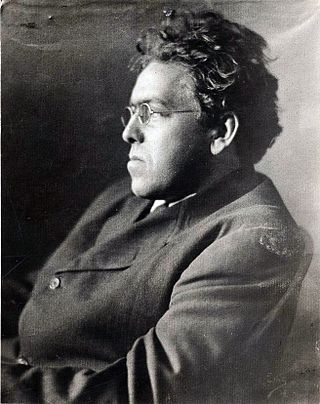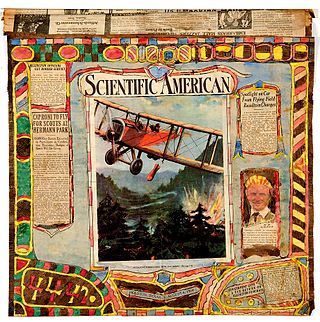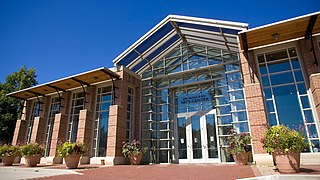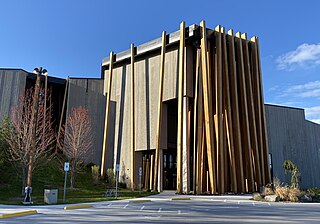Related Research Articles

Outsider art is an umbrella term for any art made by self-taught individuals who are untrained and untutored in the traditional arts with typically little or no contact with the conventions of the art worlds.

Newell Convers Wyeth, known as N. C. Wyeth, was an American painter and illustrator. He was a student of Howard Pyle and became one of America's most well-known illustrators. Wyeth created more than 3,000 paintings and illustrated 112 books — 25 of them for Scribner's, the Scribner Classics, which is the body of work for which he is best known. The first of these, Treasure Island, was one of his masterpieces and the proceeds paid for his studio. Wyeth was a realist painter at a time when the camera and photography began to compete with his craft. Sometimes seen as melodramatic, his illustrations were designed to be understood quickly. Wyeth, who was both a painter and an illustrator, understood the difference, and said in 1908, "Painting and illustration cannot be mixed—one cannot merge from one into the other."

Nek Chand Saini was a self-taught Indian artist, known for building the Rock Garden of Chandigarh, an eighteen-acre sculpture garden in the city of Chandigarh.

Charles August Albert Dellschau was a Prussian-American who gained posthumous fame after the discovery of his large scrapbooks that contained drawings, collages and watercolors of airplanes and airships. He has been classified as one of the first visionary artists.
Eugene Von Bruenchenhein (1910–1983) was an American self-taught artist from Milwaukee, Wisconsin. Over the course of fifty years, from the 1930s until his death in 1983, Von Bruenchenhein produced an expansive oeuvre of poetry, photography, painting, drawing and sculpture. His body of work includes over one thousand colorful, apocalyptic landscape paintings; hundreds of sculptures made from chicken bones, ceramic and cast cement; pin-up style photos of his wife, Marie; plus dozens of notebooks filled with poetic and scientific musings. Never confined to one particular method or medium, Von Bruenchenhein continually used everyday, discarded objects to visually explore imagined past and future realities.

The John Michael Kohler Arts Center is an independent, not-for-profit contemporary art museum and performing arts complex located in Sheboygan, Wisconsin, United States. The center preserves and exhibits artist-built environments and contemporary art. In 2021, the center opened the Art Preserve, a satellite museum space dedicated to art environments.

A visionary environment or fantasy world is a large artistic installation, often on the scale of a building or sculpture parks, intended to express a vision of its creator. The subjective and personal nature of these projects often implies a marginal status for the artists involved, and there is a strong association between visionary environments and outsider art.

Rhinestone Cowboy is the twenty-eighth studio album by American country music musician Glen Campbell, released in July 1975 by Capitol Records. It is a concept album based on the idea of an over-the-hill country musician who is uneasy about his previous fame. The album was recorded in Hollywood, and produced by Dennis Lambert and Brian Potter. Featuring the hit singles such as "Rhinestone Cowboy" and "Country Boy ", the album peaked at number 17 on the Billboard chart.

Royal Robertson, also known as the self-proclaimed Prophet Royal Robertson, was an American artist.

Rudy Rotter (1913–2001) was an American outsider and self-taught artist residing in Manitowoc, Wisconsin. Raised in Milwaukee, he moved to Manitowoc after the War in the late 1940s to set up a dental practice. After settling in and starting a family, he embarked on a simultaneous career as an artist. In the following decades he produced a prodigious volume of art.
Hipkiss is a British artist duo known for detailed figurative drawings, created using a mixed media technique that combines pencil, silver ink and metal leaf. The name is a pseudonym of married couple, Alpha and Christopher Mason.
John Maizels, educated at Latymer Upper School, Hammersmith in the early 1960s, is the founder of Raw Vision magazine which he created in London in 1989 as a forum for the work of self-taught artists, or unknown geniuses, which he felt was overlooked and under-appreciated. Initially published biannually and now quarterly, Raw Vision remains the world's only international journal of outsider art and continues to contribute dialogue to the international field.
Norbert Kox was an American outsider artist whose paintings display an unusual approach to religious iconography.
The Kohler Foundation, Inc., is a philanthropic organization that works in the areas of art preservation, grants, scholarships, and performing arts.

Hawkins Bolden (1914–2005) was an American artist known for his "scarecrow" assemblages made from pots, pans, leather belts, rubber hoses and other found materials.
Kevin Blythe Sampson is an American artist and retired police officer living in Newark, New Jersey. He makes sculptures from discarded found objects that act as memorials for various people who have died. He has a studio based out of Newark.
Vernon Burwell (1916–1990) was an African-American sculptor known for his painted cement sculptures of animals and busts of historical figures such as Abraham Lincoln, Sojourner Truth, and Martin Luther King Jr.
Mary Le Ravin was an African American visionary artist and ordained minister. She was a self-taught artist best known for creating sculptures, jewelry, household items and trinkets out of animal bones, natural materials, and other found objects.
Ruth DeYoung Kohler II was a museum director and teacher from Wisconsin who championed under-recognized, self-taught artists and vernacular art. She was the director of the John Michael Kohler Arts Center from 1972–2016. She led the development of the Art Preserve in Sheboygan, Wisconsin, the first museum dedicated to the exhibition and conservation of artist-built environments.

The Art Preserve is an art museum and a satellite campus of the John Michael Kohler Arts Center. The preserve houses a collection of artist-built environments and sculptural works. It is designed by Tres Birds and located in Sheboygan, Wisconsin. Opened in June 2021, the Art Preserve is the first museum dedicated to the exhibition, preservation, and care of artist-built environments. The museum also serves as a research space for the art environment genre.
References
- ↑ Kristin G. Congdon; Kara Kelly Hallmark (2012). American Folk Art: A Regional Reference. Santa Barbara, California: ABC-CLIO, LLC. pp. 269–272. ISBN 9780313349379.